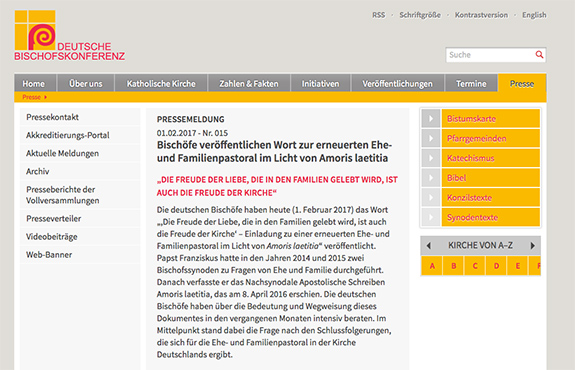

Displaying somewhat more scholarly technique than was shown in the Maltese Disaster (whereby that nation’s two bishops flatly contradict unbroken ecclesiastical observance by stating that holy Communion cannot be withheld from divorced-and-remarried Catholics, living sexually actively, if they feel “at peace with God”), the German Episcopal Conference statements on the implementation of Pope Francis’ Amoris laetitia just as effectively repudiate Canon 915 and the canonical-moral tradition that it represents.
More directly than do Amoris and the Buenos Aires plan, if less blatantly than do the Maltese, the Germans claim that no general rule exists (Für die Frage nach dem Empfang der Sakramente sehen die Bischöfe in Amoris laetitia keine allgemeine Regel und keinen Automatismus) to guide ministers of holy Communion when they are approached for the sacrament by divorced-and-remarried Catholics living sexually actively, that is, by those whom unanimous canonical and moral tradition recognize as ‘obstinately persevering in manifest grave sin’ (Canon 915, CCC 2384).
In the alleged absence of a rule, say the Germans, a case-by-case discernment process should be conducted and, if the results of that process lead a sexually active, divorced-and-remarried Catholic to approach for holy Communion, “that decision must be respected” (Aber auch eine Entscheidung für den Sakramentenempfang gilt es zu respektieren)—less in-your-face phrasing, I grant, than the express Maltese claim that holy Communion cannot be withheld in such cases, but just as effectively a directive to ministers, under pain of disrespecting a decision that “must be respected”, to distribute holy Communion under circumstances unquestionably forbidden by the rule of Canon 915. Faithful ministers of holy Communion in Germany now join those in Malta as needing special prayers against the pressures they will inevitably face in the wake of their bishops’ failure to “urge the observance of all ecclesiastical laws … especially regarding … the celebration of the sacraments” (1983 CIC 392).
By the way, other passages in the German documents imply that Confession, too, might be sought in these cases, but without, it seems, requiring of penitents a ‘firm purpose of amendment’ (even in regard to voluntary sexual activity with a non-spouse). As I noted in HPR a few years back, this approach exposes the celebration of Penance to the risk of sacrilege and its minister to the charge of solicitation in confession.
I realize that some find “making a mess” to be a governing virtue, but it can hardly be denied that, in the wake of several ambiguities in Amoris, ambiguities that must be resolved, a spreading “mess” of Catholic sacramental practice in general and of the Church’s witness to the indissolubility of Christian marriage in particular, is being made, regardless of what anyone’s intentions might have been going into it.
If you value the news and views Catholic World Report provides, please consider donating to support our efforts. Your contribution will help us continue to make CWR available to all readers worldwide for free, without a subscription. Thank you for your generosity!
Click here for more information on donating to CWR. Click here to sign up for our newsletter.


